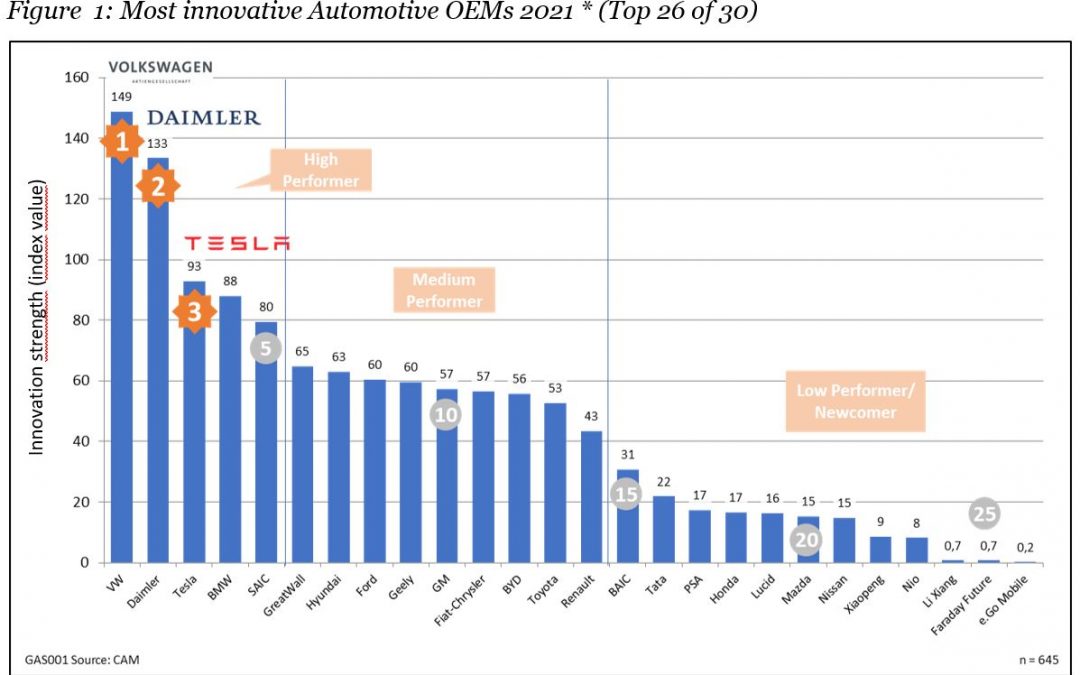- Volkswagen is ahead of Daimler and Tesla at the top of the most innovative car groups in 2021. Together with BMW in fourth place, the German manufacturers have a high level of innovation strength in the automotive future fields.
- For the first time, three Chinese automobile manufacturers are among the top 10 most innovative groups. In a country comparison, the Chinese manufacturers already have the highest innovative strength after Germany.
- The innovative strength of Japanese and French automobile manufacturers, on the other hand, remains very low. The world’s top-selling manufacturer Toyota, which only ranks 13th, is disappointing.
- Among the premium brands, Mercedes-Benz is by far the most innovative manufacturer, followed by Tesla, which for the first time since the start of the study in 2005 came in second among the most innovative premium brands.
The ranking of autmotive OEMs
Volkswagen is the most innovative automotive group in 2021 and is just ahead of Daimler and third-placed Tesla (see Fig. 1) With a total of 67 innovations, including 24 world novelties, Volkswagen achieved an index value of 149 points and was able to maintain its top position from the previous year. The Wolfsburg-based multi-brand group showed particularly strong performance in the area of electromobility and in the area of interfaces (e.g. augmented reality head-up display) (see appendix 1). Daimler, which has improved by one place compared to the previous year, scores among other things with autonomous driving (S-Class, traffic jam pilot) and the MBUX operating system. Tesla improved by three places and earned two thirds of the innovation points in the field of electromobility, among other things through high charging capacities and long ranges of its electric models.
CAM analyzed the innovations of 30 global automobile manufacturers (OEM) and startups with around 80 automobile brands. A total of 645 innovations from OEMs from the four most important technological future fields came in the sample for 2020/2021. Each innovation was recorded individually and systematically assessed according to CAM‘s „M.O.B.IL criteria“* such as originality and customer benefit.
Figure 1: Most innovative Automotive OEMs 2021 * (Top 26 of 30)
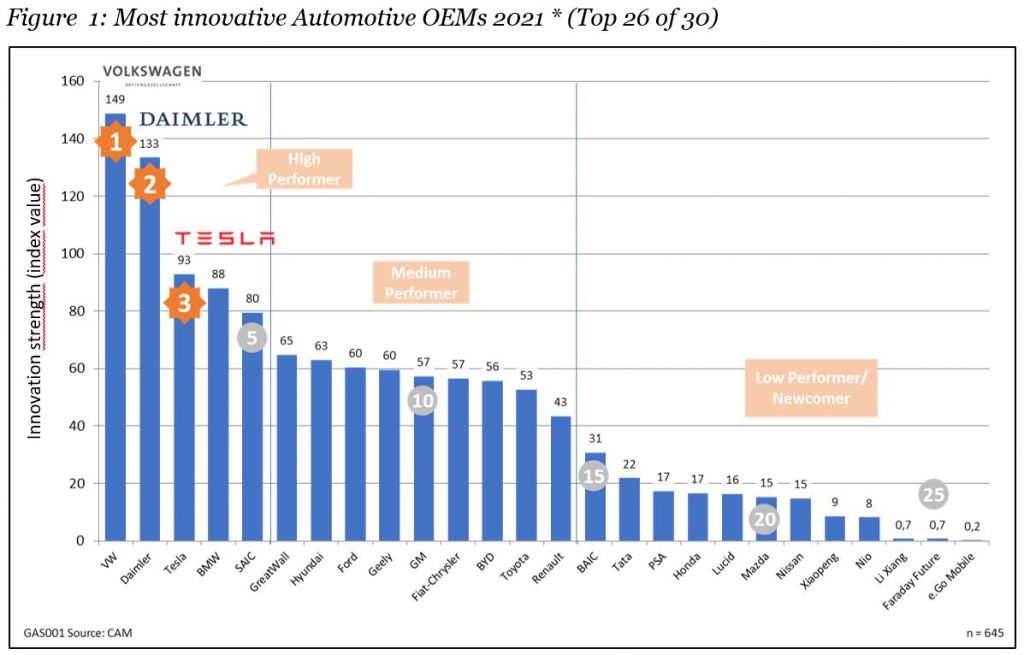
In addition to BMW (4th place, previous year: 2nd), the high performers of the year also included the Chinese SAIC Group, which made the biggest leap forward and moved up from 23rd to 5th place. Above all, SAIC brings innovations from the Roewe and Baojun brands in the field of electromobility and driver assistance systems. This is not only the first time that a Chinese automobile manufacturer has made it into the top 5 of the innovation ranking that has been carried out since 2005. In addition to SAIC, with Great Wall in 6th place (previous year: 11th) and Geely (including Volvo) in 9th place, three Chinese automotive groups are among the ten most innovative automotive companies of the year. With BYD (rank 12, previous year: 7) and the start-ups Nio and Xpeng, other Chinese OEMs are increasingly entering the limelight with innovations. This reinforces a trend that has been evident for a number of years towards the increasing importance of Chinese automobile manufacturers, which after Germany already have the highest innovative strength.
Hyundai (previous year: 5), Ford (4) and Geely (8), all of which only deteriorated slightly in the past year, landed in the front mid-range in ranks 7 to 9 with over 60 innovation index points. On the other hand, General Motors (from 12 to 10) and Fiat-Chrysler (from 17 to 11) can improve, also thanks to their innovations in the electrical sector: While GM can record improvements in fuel consumption and range for the Buick Velite 7, the electric Fiat 500 is convincing in its segment thanks to its high ranges and charging capacities.
In contrast, the Japanese and French groups only come in the back of the innovation ranking. The largest global automobile manufacturer, Toyota, again only came in 13th with 53 innovation points, while Honda was only 18th (previous year: 25th) and Nissan 21st (18th). Renault and PSA have deteriorated compared to the previous year and only come in 14th (10th) and 17th (9th) respectively.
Study leader Stefan Bratzel: “The paradigmatic change in the industry can only be mastered by a high level of innovation on the part of the players. However, many automobile manufacturers do not have the necessary skills and resources to emerge successfully from this transformation and are forced to enter into far-reaching partnerships. From an innovation point of view, German automobile manufacturers are doing very well so far. In the future, in addition to Tesla, they will also have to deal with new, innovative competitors from China who are well positioned in the core fields of electromobility, connectivity and autonomous driving.“
The leaderboard of the premium brands
Mercedes-Benz is the most innovative premium brand for the third year in a row with currently 133 index points. The premium manufacturer from Stuttgart refers Tesla and BMW to places 2 and 3 (see Fig. 2). During the study period, Mercedes generated 54 innovations, including 23 world firsts such as the autonomous traffic jam pilot Drive Pilot in the S-Class (see Appendix 2).
Tesla ranks second among the most innovative premium brands for the first time, outperforming BMW and Audi. This is all the more astonishing since the Californian newcomer has relatively few models to offer compared to the German OEMs. Tesla succeeds particularly in the fields of electromobility and driver assistance systems in generating world firsts with high dynamics and transferring them to the production series. Over the years, Tesla has established itself among the most innovative premium manufacturers. The BMW brand also shows strong innovation in third place (previous year: 2), e.g. with an active traffic light assistant or geofencing innovations for emission-free driving.
Figure 2: Ranking of the most innovative premium brands 2021
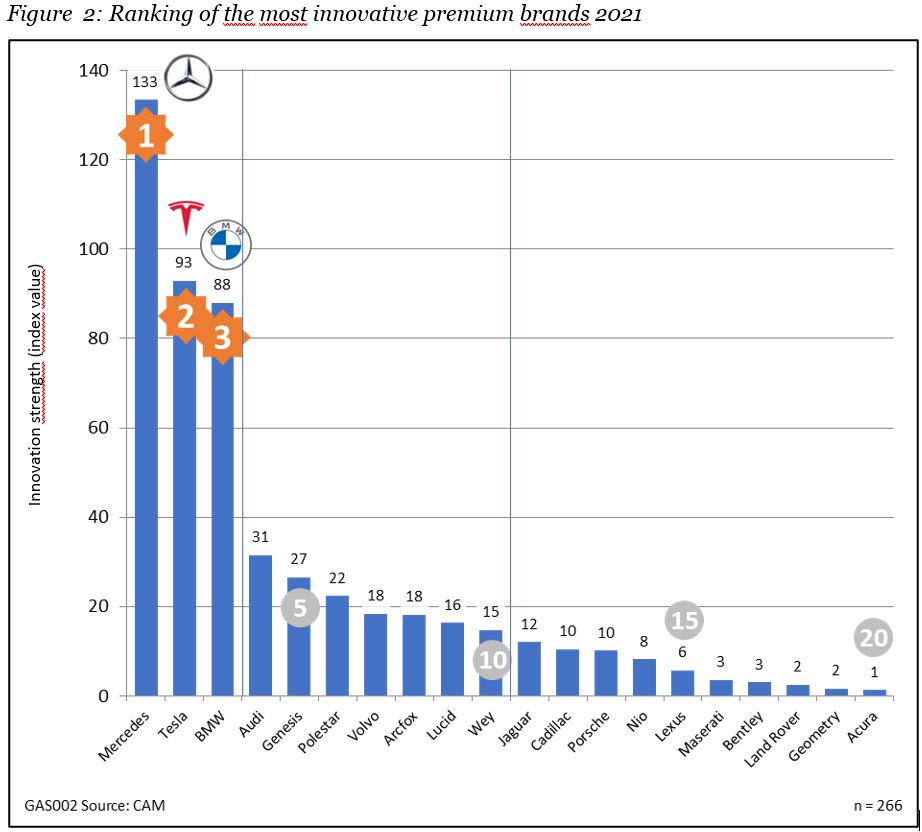
With 31 index points, Audi only came fourth in this year’s evaluation (previous year: 3). For Audi, this is the worst position since 2013 (4th place), with the Ingolstadt-based brand in 2015 and 2016 even being the most innovative brand. Here, the foothills of the diesel scandal and the frequent changes in management seem to have negatively influenced the innovative ability of the otherwise highly innovative manufacturer.
Ranks 5 to 10 follow with Genesis (Hyundai), Polestar (Geely), Volvo (Geely), Arcfox (BAIC), Lucid (Lucid) and Wey (Great Wall), predominantly premium brands from Chinese corporations. The gap to the top innovators is still considerable. At the same time, there is a good chance that newcomers – including Nio – will also establish themselves in the premium environment with the help of innovations.
Appendix 1: Innovation profile of Volkswagen Group 2020/2021
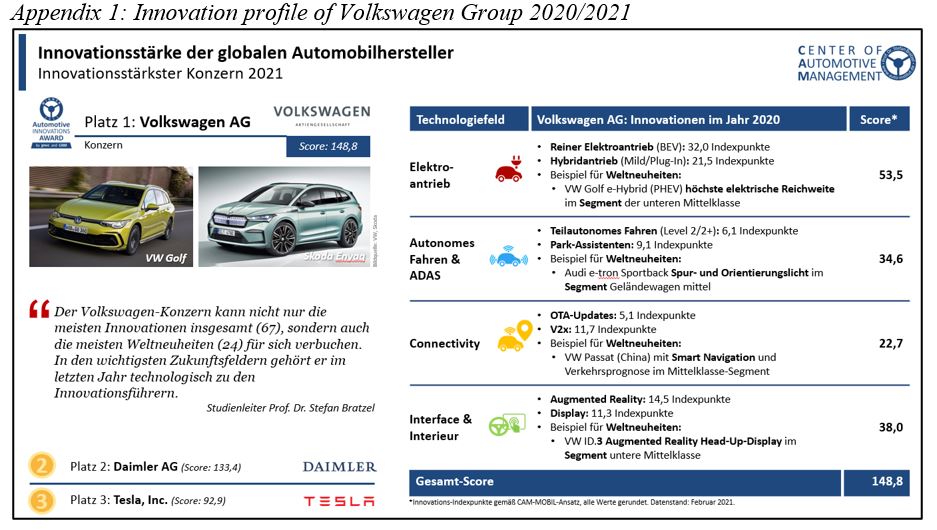
Appendix 2: Innovation profile of Mercedes-Benz brand 2020/2021
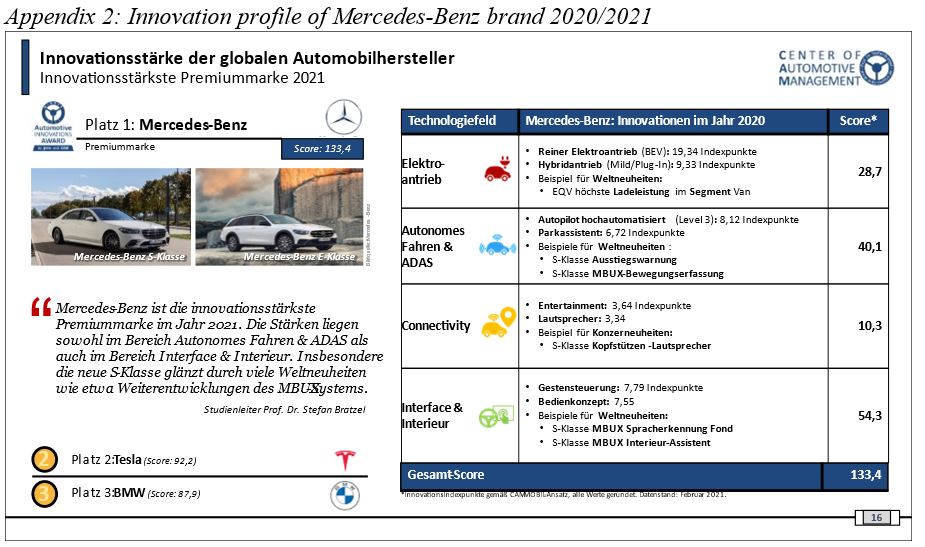
* About the methodology:
In order to comprehensively answer the core questions of the CAM innovation study about the current and future innovation trends in the automotive industry and their players, several hundred technical innovations have been collected for 16 years according to around 50 defined criteria such as innovation type, originality, degree of maturity, etc. and according to the MOBIL- Approach individually assessed qualitatively. Innovations are defined as novelties that generate new or additional customer benefits compared to the status quo. For example, world firsts that are available in series are rated higher than “me-too” innovations or, for example, pure studies or prototypes are available. This results in an index value for every innovation, which can be condensed into total values for individual groups, brands or models, for example. A methodological overview can be found here: http://www.automotiveinnovations.de/download/MOBIL-Approach.pdf
About the study:
The overall study AutomotiveINNOVATIONS 2021, which comprises approx. 150 PowerPoint pages with approx. 120 graphics, figures and tables, can be pre-ordered for a fee at www.auto-institut.de. On the basis of 645 categorized and individually assessed, vehicle technical innovations of the year 2020/21, it identifies the future trends of 30 automotive groups with around 80 brands from Europe, Japan, the USA and China, among others.
Link to order the study:
Further Information:
Center of Automotive Management (CAM)
Prof. Dr. Stefan Bratzel
Director
Tel.: (02202) 2 85 77-0 / (0174) 9 73 17 78
E-Mail: stefan.bratzel@auto-institut.de
www.auto-institut.de
About CAM
The Center of Automotive Management (CAM) sees itself as an independent institute for empirical automotive and mobility research as well as for strategic consulting. The Auto-Institut supports its customers on the basis of extensive automotive databases, in particular on vehicle technology innovations in the automotive industry. With more than 15,000 individually evaluated innovations from automobile manufacturers and automotive supplier companies, which are updated several times a year, the CAM innovation database has valuable knowledge in all relevant technology fields. It is supplemented by the database of mobility services, which will form an increasingly important business field for manufacturers in the future. With the help of well-founded industry know-how and intimate knowledge of the market, the Auto-Institut develops individual market research concepts and practice-oriented solutions for its customers in the automotive and mobility industries.

